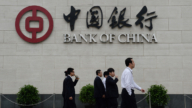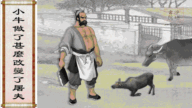【新唐人2011年12月6日讯】中国人民银行日前发布一份报告,认为大陆楼市的房价拐点已初现端倪。部分商业银行担忧出现恐慌性抛售。但随着央行下调存款准备金率,也有人猜测楼市调控将会放松。而大陆住建部则要求,各地明年继续执行限购政策。大陆房地产调控出现混乱,让我们来听听专家的分析。
央行调查统计司在11月24号举办的“房地产金融风险管理”座谈会上,通报了《当前房地产市场形势分析报告》和《房地产市场变化对金融业影响的调查报告》。报告认为,数据显示,房地产开发投资增速开始回落,房地产开发企业资金趋紧,土地交易市场量价齐跌,房价拐点已经出现。
座谈会上,部分商业银行代表提出,房价下跌20%后,会不会诱发恐慌性抛售?对于抛售,当局能不能采取有效措施,令人担忧。
政治经济评论家草庵居士:“中国的房地产在最近10来年当中,尤其是08年之后,已经疯狂到了极点。泡沫化是大家都可以看到的,中国(中共)政府只不过是最近承认了这个事实。而且,这种恐慌性随着时间的发展,还会加剧。”
央行11月30号宣布,从12月5号起,下调银行存款准备金率0.5个百分点。这是央行3年来首次下调存款准备金率。有评论认为,这是“货币政策放松的信号”,也有人猜测,这可能意味着楼市调控政策将会放松。
但在此之前,大陆住建部已经要求10个城市的地方政府,在这个月底房屋限购政策到期之后,继续实施限购令。
政治经济评论家草庵居士:“中国(中共)政府面临一个紧缩、一个滞涨这种情况,它是很难处理的,它实际上是两头做不到的。如果刺激经济、增发钱的话,就推高房地产;而如果不发钱的话,经济就会全面崩溃。对它们来说,这是一个很严重的问题。”
今年以来,欧元区的危机促使欧洲各国遏制消费、进口减少。中国对欧洲出口因此大幅度衰退,制造业迅速萎缩。
“纽约市立大学”经济学教授陈志飞指出,这种衰退让中共当局始料不及,大陆经济面临滞涨的危险。
陈志飞:“它(当局)没有想到,中国的制造业、中国的整个经济发展速度,会趋于一个硬着陆的状态。所以,它采取了一个紧急的措施。等于这个车要停了,要撞掉了,现在又踩了一下油门,这就是它为什么提高了储备金0.5%。”
陈志飞认为,当局又要刺激发展,避免经济硬着陆,又要打压楼市来减缓通货膨胀,处于两难境地。他强调,当前,因为惧怕物价过高威胁统治,中共会试探继续打压楼市,来缓解巨大民怨;但明年当局有可能放松流通、再度大幅刺激经济发展。
中国指数研究院12月1号公布的数据显示, 11月份全国上百个城市住宅均价连续第三个月环比下降,且降幅有所扩大,专家预计,未来大陆房价将加速下滑。
新唐人记者常春、李谦、李月采访报导。
China’s House Prices: Authorities Dilemma
People’s Bank of China issued a report that house prices
in mainland China have reached a turning point.
Some commercial banks are worried about panic selling.
With the Central Bank decreasing the deposit reserve ratio,
people also think the house market regulation will be relaxed.
However, the Ministry of Housing requires the policy
of constraining house purchase to continue next year.
The real estate regulation in mainland China appears chaotic.
Let’s hear what experts think on the issue.
On November 24, the Central Bank and Statistics’ Department
issued two reports on “real estate financial risk management.”
They were,
“The situation analysis of current real estate market,” and
“Investigation report on the impact of real estate market
changes to financial sectors,” and were presented in a forum.
The reports show that according to data, the investment
growth rate of real estate development has begun to fall.
The enterprise funds for real estate development
show a trend of shrinking.
Both the amount and the prices in land market are falling.
The inflection point of house prices has occurred.
At the forum, some representatives of commercial banks asked
whether to induce panic sell-off if the house prices fall by 20%.
The sell-off itself can be a worrying trend,
if the authorities are not able to take effective measures.
Caoan Jushi (political and economic commentator):
“The real estate in mainland China in the last 10 years,
especially after 2008, has reached an extreme in insanity.
The bubble is something everyone can see.
Chinese government only recently acknowledged this fact.
Moreover, this panic will grow with time, and will intensify.”
On November 30, Central Bank announced, from December 5,
the deposit reserve ratio is lowered by 0.5%.
This is the first time that the Central Bank has lowered
the deposit reserve ratio within 3 years.
Some commentators believe that this
is “a signal of relaxing monetary policy.”
Some people also speculate that this may mean,
the regulation of housing market will be relaxed.
However, before this China’s Housing Ministry asked local
governments of 10 cities to continue the policy of constraining house purchase, after it expires at the end of this month.
Caoan Jushi: “Chinese government is facing an austerity,
a stagflation situation. It’s difficult to deal with it.
It’s actually not able to do both. If it stimulates the economy
and issues more money, it will boost the real estate bubble.
If it does not issue money, the economy will collapse.
For it (the Chinese government), this is a very serious problem.”
This year, the crisis in the euro zone caused the European
countries to curb consumption and decrease imports.
Chinese exports to Europe have also dramatically declined.
Thus China’s manufacturing sector declines rapidly too.
Economics professor at City University of New York,
Chen Zhifei, points out that
the recession makes CCP (Chinese Communist Party)
authorities’ prediction to fail,
He thinks the economy in mainland China
faces the risk of stagflation.
Chen Zhifei: “It (CCP) did not think China’ manufacturing
industry and economic growth rate will reach a hard landing point.
So it had to take an emergency measure.
It equals to stopping a car by bumping it.
Now they experience the throttles.
This is why they increased the reserves by 0.5%.”
Chen Zhifei thinks the authorities want to stimulate growth
and avoid hard landing,
but also to suppress real estate market to slow down inflation.
Therefore they are in a dilemma.
He stressed that at present they are afraid the high commodity
prices will threaten their power.
Thus CCP would continue trying to suppress the house market,
in order to ease the tremendous resentment in people.
But next year the authorities may loosen the circulation,
and significantly stimulate the economic development again.
China Index Research Institute released
a new data on December 1.
It shows that in nearly 100 cities the average house prices
in November have declined for a third consecutive month.
And that the decline rate has expanded. Thus experts predict.
the house prices in mainland China will be falling quickly.
NTD reporters Chang Chun, Li Qian and Li Yue





























